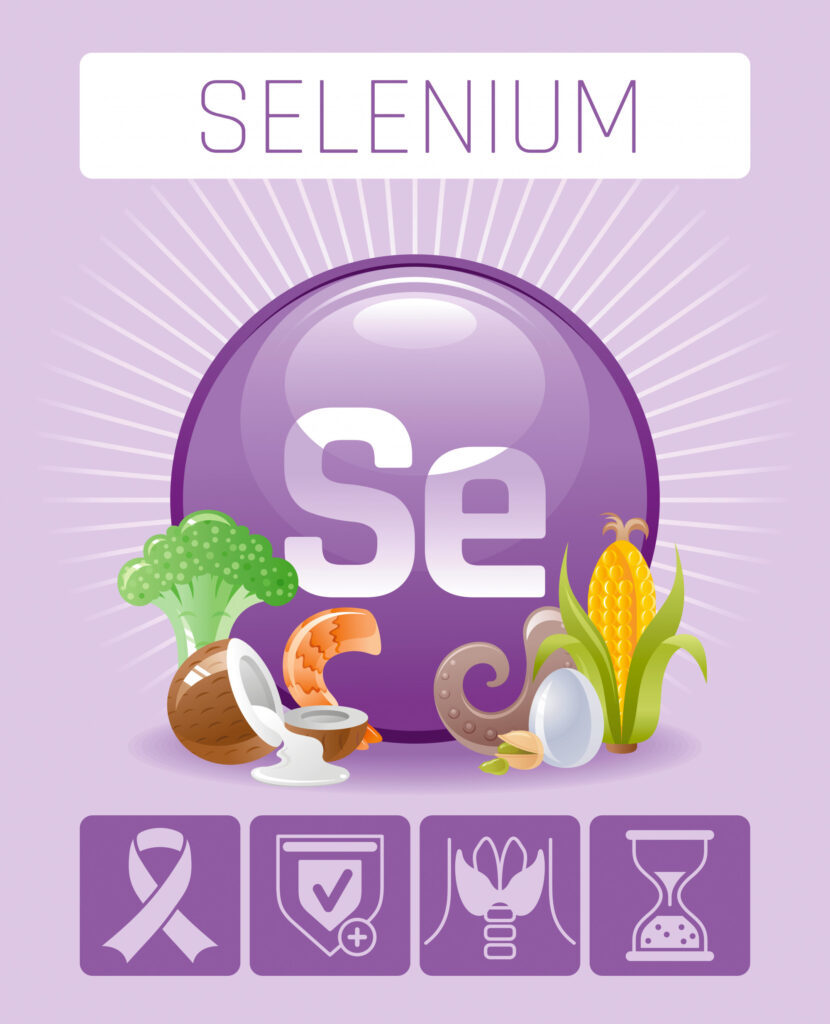Selenium’s role in cancer care
The role of selenium in cancer prevention
Research shows that selenium may play a role in preventing a variety of cancers, including prostate, lung, colorectal, and liver cancer. The main mechanism by which selenium exerts its protective effect is its antioxidant properties. Selenium is a key component of selenoproteins, which fight oxidative stress by neutralizing free radicals. Free radicals can damage cellular components, includingDNA, which can lead to the development of cancer. By reducing oxidative damage, selenium helps maintain cell integrity and reduces the risk of mutations that can cause cancer.
In addition, selenium is involved in immune responses. Research shows that selenium can enhance the function of immune cells, such asTcells and macrophages, which are critical in identifying and destroying cancer cells. Higher selenium levels are associated with a reduced risk of certain cancers, although the exact mechanisms are still being studied.
Application of selenium in cancer treatment
In addition to its preventive effects, selenium has shown potential as an adjuvant in cancer treatment potential. Some studies suggest that selenium supplements may enhance the effects of chemotherapy and radiation therapy while reducing their side effects.
Application of intravenous selenium in cancer care
Intravenous injection (IV) Selenium provides a method of direct and controlled delivery of this important micronutrient into the body, which is particularly beneficial in the context of cancer care. This approach is often used when a selenium deficiency needs to be corrected quickly, or when higher doses are needed to achieve a therapeutic effect that cannot be achieved with oral supplements.
Study shows intravenous selenium can help reduce toxicity associated with chemotherapy and radiation therapy , achieve this purpose by reducing oxidative stress. Selenium’s powerful antioxidant properties may protect healthy cells from oxidative damage caused by cancer treatment, thereby reducing treatment-related side effects such as fatigue, nausea, and organ damage.
In addition, intravenous selenium may also play a role in enhancing the immune response during cancer treatment, improving the body’s ability to respond not only to The ability to fight cancer cells and also fight infections that may occur due to immunosuppression caused by cancer therapy. Controlling the delivery of selenium via intravenous injection can also help ensure that patients receive the optimal dose, maximizing potential therapeutic benefit while minimizing the risk of toxicity.
Additionally, there is evidence that intravenous selenium may help induce cancer Apoptosis (programmed cell death) of cells, thereby inhibiting tumor growth. This ability to selectively induce cell death in cancer cells without affecting normal cells is a major advantage in cancer therapy and highlights the potential of selenium as an adjuvant in cancer treatment.
Current suggestions and considerations
Despite the encouraging potential of selenium in cancer care, selenium supplementation , especially by intravenous injection, should be performed with caution. The relationship between selenium and cancer is complex and appears to be influenced by multiple factors, including selenium form, dose, baseline levels of selenium in the body, and genetic factors. Both deficiencies and excess of selenium are associated with adverse health outcomes, including an increased risk of certain cancers.
Healthcare providers often recommend getting selenium through a balanced diet rather than supplementation dose unless selenium deficiency is established. In cancer patients or high-risk groups, selenium supplementation, especially by intravenous injection, should be taken under strict medical supervision, as excessive intake can lead to toxicity.
Conclusion
Selenium is a key micronutrient with significant potential for cancer care. Its antioxidant properties, immune-enhancing effects, ability to induce apoptosis in cancer cells, and potential benefits provided through intravenous administration make it a strong candidate for cancer prevention and treatment. However, further research is needed to fully understand the conditions under which selenium is most beneficial in cancer care. As always, patients should consult their healthcare provider before making any dietary, supplementation changes or considering intravenous selenium therapy.
References
– Hatfield, D. L., Tsuji, P. A., Carlson,
B. A., & Gladyshev, V. N. (2014). Selenium and selenocysteine: Roles in
cancer, health, and development. Trends in Biochemical Sciences, 39(3),
112-120. https://doi.org/10.1016/j.tibs.2013.12.007
– Rayman, M. P. (2012). Selenium and human
health. TheLancet, 379(9822), 1256-1268.
https://doi.org/10.1016/S0140-6736(11)61452-9
– Vinceti, M., Filippini, T., Del Giovane,
C., Dennert, G., Zwahlen, M., Brinkman, M., … & Horneber, M. (2018).
Selenium for preventing cancer. Cochrane Database of Systematic Reviews, 1.
https://doi.org/10.1002/14651858.CD005195.pub3
– Méplan, C., & Hesketh, J. (2012).
Selenium and cancer: A story that should not be forgotten—Insights from
genomics. Cancer Treatment and Research, 159, 145-166.
https://doi.org/10.1007/978-1-4614-3660-9_8
– Broome, C. S., McArdle, F., Kyle, J. A.,
Andrews, F., Lowe, N. M., Hart, C. A., & Arthur, J. R. (2004). An increase
in selenium intake improves immune function and poliovirus handling in adults
with marginal selenium status. American Journal of Clinical Nutrition, 80(1),
154-162. https://doi.org/10.1093/ajcn/80.1.154
Medical Disclaimer:
The information provided in this article is for educational and reference purposes only and does not constitute medical advice , and should not be used as a substitute for professional medical diagnosis, treatment or advice. Always consult your physician or other qualified health professional with any questions you may have regarding your medical condition or medical problems. The content of this article is not intended to recommend any specific test, treatment, or medication and should not be considered such advice. If you develop symptoms or need medical assistance, please contact a medical professional promptly.

